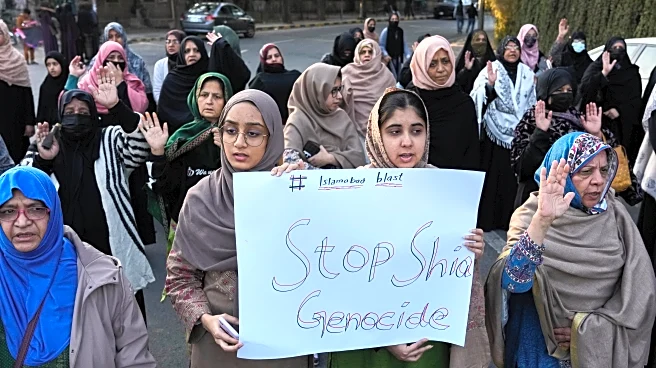Rapid Read • 8 min read
King Charles III led commemorations for the 80th anniversary of Victory over Japan Day, honoring World War II veterans and survivors. The event took place at the National Memorial Arboretum in Alrewas, Staffordshire, where Charles and Queen Camilla were joined by Prime Minister Keir Starmer and other dignitaries. The ceremony included wreath-laying and a two-minute silence observed nationwide. Charles delivered a speech acknowledging the courage and sacrifice of those who served in East Asia and the Pacific during the war. The event featured flypasts by the Red Arrows and WWII-era aircraft, and veterans shared their experiences of the conflict.
AD
The commemoration serves as a reminder of the sacrifices made during World War II and the enduring impact of the conflict on global history. It highlights the importance of remembering the contributions of veterans and the lessons learned from the war. The event also draws parallels between past and present conflicts, emphasizing the need for vigilance in preserving peace and liberty. The participation of high-profile figures like King Charles III and Prime Minister Keir Starmer underscores the significance of the occasion in British national memory and its role in fostering unity and reflection.
The commemorations are expected to continue with various events across the UK, including services at notable locations like the Tower of London and Belfast City Hall. The focus will remain on honoring veterans and educating future generations about the war's impact. Political leaders may use the occasion to reinforce commitments to peace and international cooperation, drawing lessons from the past to address current global challenges. The Royal British Legion and other organizations will likely continue their efforts to support veterans and preserve their stories for posterity.
The event also touches on the ethical implications of war, particularly the atomic bombings of Hiroshima and Nagasaki, which King Charles III acknowledged in his speech. This aspect of the commemoration invites reflection on the human cost of war and the moral responsibilities of nations to prevent such devastation in the future. The ceremony serves as a platform for discussing the broader cultural and historical narratives surrounding World War II, including the roles of different nations and the ongoing impact of wartime decisions.
AD
More Stories You Might Enjoy












